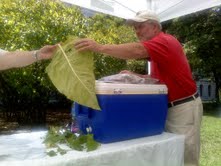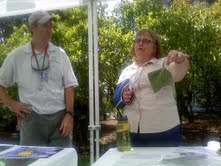Written by Kayla Harless, People’s Garden Intern
Throughout July, the People’s Garden Healthy Garden Workshops have been focused on plants and their problematic pests – diseases, fungi, viruses, harmful bugs, and environmental stressors. Today’s workshop covered a range of these, and included lots of local examples from gardens right here on the National Mall.
Mary Kay Malinoski and David L. Clement are regional specialists in Integrated Pest Management (IPM) from the University of Maryland, with specialties in Entomology and Plant Pathology. Today they combined resources with Graham Davis, the IPM Coordinator from the Smithsonian Institution, to provide an educational workshop.
While aphids are not bugs people are fond of having in their gardens, many natural enemies will come to control the problem. Green lacewings, lady beetles, and syrphid flies are attracted to and devour aphids. In fact, green lacewings will find patches that are infested and lay their eggs in that area, so that when the larvae hatch they have plenty to feed on. While the larvae of these helpful insects can sometimes be mistaken for bad bugs, they all feed on aphids and other plant pest bugs too.
Damage by other garden pests such as lace bugs, whiteflies, and spider mites can be detrimental. If your garden is heavily infested, you may want to think twice before using remedies such as spraying pesticides or using soap on the plant. These quick fixes can fry the plant by being absorbed into the bitten, infected foliage, and harm them further. In this case, the best option may be to remove the contaminated plant altogether.
Environmental factors make or break a growing season for a plant. Here in Washington, DC it has been an uncharacteristically hot summer. Resultingly, many plants, trees, and even turf have sun scald and/or heat damage. Relocating plants to healthier places out of direct sunlight can help the plant remain happy and healthy.
This coming August, the People’s Garden workshops theme is different types of gardens. We hope to see you there!



